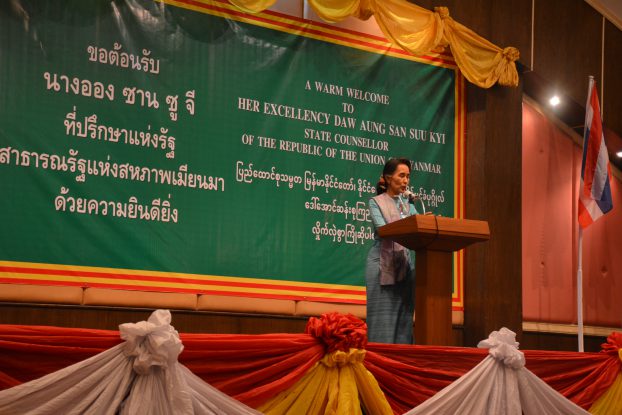Burma’s State Counsellor Aung San Suu Kyi has issued an apology via Facebook to supporters who stood in the rain for hours hoping to see her during her visit on Thursday to Mahachai, home to Thailand’s largest community of Burmese migrant workers.
Hundreds of Burmese migrants armed with flags and posters of Suu Kyi were locked out of the meeting venue, where only around 300 workers were given access to the state counsellor.
“It was incredibly badly organised,” said Andy Hall, an advisor on international affairs for the Migrant Workers Rights Network (MWRN), a group that supports Burmese migrants living in Thailand. Hall said he was also denied permission to enter the venue despite being invited as a guest of honour by the Burmese government.
Only 500 handpicked workers from the nine “best” factories in the area were allowed in to hear Suu Kyi speak at a hall near Mahachai’s Talay seafood market — but that number was later cut again as roads near the venue were blocked due to the large crowds that had gathered to welcome her.
“The way they chose the nine factories was almost communist-like behaviour,” said Hall. “It was just shameful the way they organised it and it goes to show again that the Thai government has absolutely no idea how to have effective public relations in an event like this.”
Miscommunication between the Thai and Burmese authorities meant that Burmese migrants who believed they would be given access to Suu Kyi if they arrived at the venue early were disappointed to learn that this was not the case when they showed up early Thursday morning.
“This is unfair,” said one man who spoke to a DVB reporter . “A couple of us travelled here all the way from the border because we want to see Amay [Mother].”
Despite the speech setbacks and stampedes, Hall said it was a “symbolic day” that filled the Burmese migrants with hope.
In her speech inside the hall, Suu Kyi said the Burmese government would consider issuing passports to undocumented Burmese nationals living in Thailand.
“At the moment, we are trying to get the Certificate of Identity for our citizens — ideally, we want you to have passports and Thailand as the host country is not objecting to this,” she said.
She also pledged to help to increase protections for workers so they could feel safe in their workplace — a promise welcomed by the migrants, who often complain of exploitation by their employers.
Suu Kyi’s three-day visit continues today with closed-door talks with her Thai hosts, as the two countries prepare to sign agreements on the employment of migrant workers and border crossings.
According to Hall, the Memorandum of Understanding (MOU) on migrant workers will include more stringent registration requirements and the creation of pre-departure training centres for workers. A blacklist of abusive employment brokers, clear-cut wage structures and passports for workers going to Thailand will also be part of the deal, he said.
Unconvinced that the MOUs will change any conditions on the ground, Migrant Assistance Program (MAP) Foundation director Brahm Press says “MOUs are a good start, but are more like agreements on intent rather than guidelines on implementation.”
[related]
He said inherent policy problems are still not being addressed.
“Migrants still do not have the ability to register themselves — they are reliant on employers, who delegate responsibility to brokers. On the other hand, if formal migration can be made more accessible, transparent and affordable, it could increase protections for migrants.”



